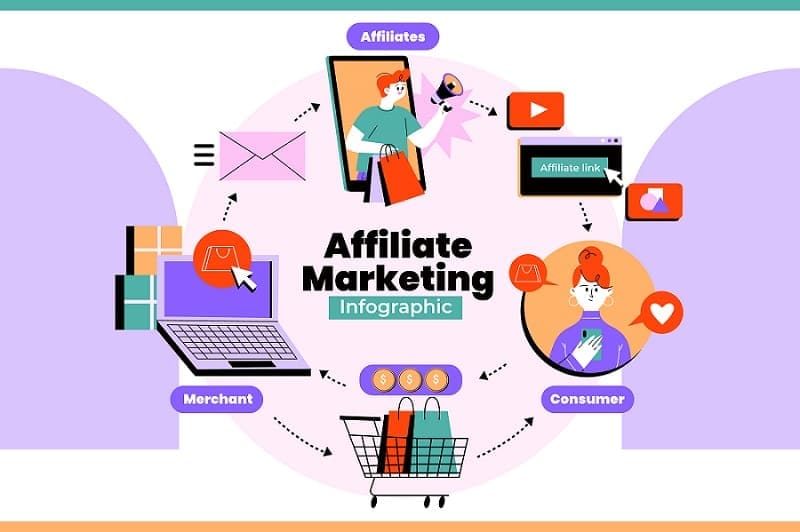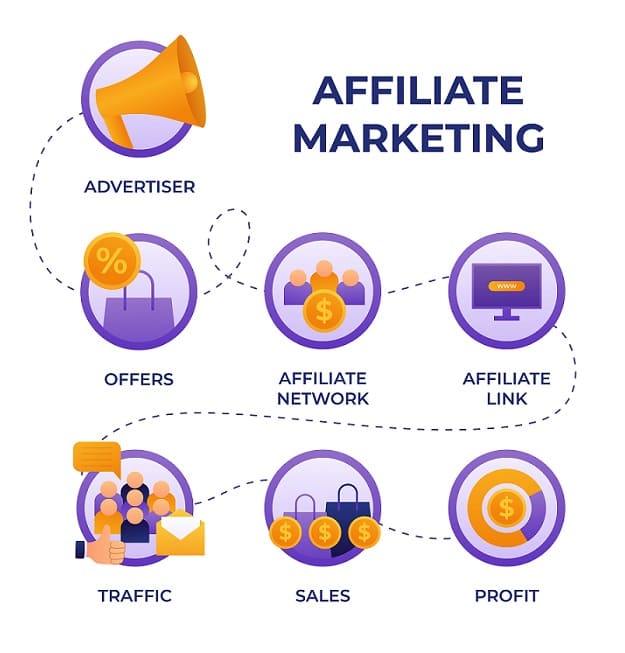How to earn money with a blog?
A blog is a website or section of a website that publishes written content, usually in the form of articles or posts. The content is usually organized chronologically, with the most recent post appearing at the top. Blogs can cover a wide range of topics, from personal musings to news and current events to specialized topics such as technology or cooking. Many bloggers use their blog as a platform to share their thoughts, experiences, and knowledge with a wider audience.
There are many ways to earn money with a blog, some of which include:
- Sponsored content:
- You can include sponsored content in your blog and get paid by the company or individual that is sponsoring the content.
- Advertising:
- You can sell advertising space on your blog to companies or individuals who want to advertise their products or services.
- Affiliate marketing:
- You can promote products from other companies on your blog and earn a commission for each sale made through your referral.
- Digital products:
- If you have expertise in a particular area, you can create and sell digital products such as ebooks, courses, and printables.
- Services:
- You can offer services such as consulting, coaching, or freelance writing to your readers.
There are many other ways to monetize a blog, and the best approach for you will depend on your niche, audience, and goals. It’s important to remember that it can take time to earn a significant income from a blog, and it’s important to be patient and consistent in your efforts.
Table of Contents on how to earn money with a blog
FAQ – Frequently Asked Questions about how to earn money with a blog
How can I start making money from my blog?
There are several ways to monetize a blog, including through advertising revenue, sponsored content, affiliate marketing, selling products or services, and offering premium content or memberships.
What is affiliate marketing and how can it help me earn money on my blog?
Affiliate marketing involves promoting other companies’ products or services on your blog. When your readers click on the affiliate links and make a purchase, you receive a commission.
How can I earn money through advertising on my blog?
You can display ads on your blog through programs like Google AdSense. You earn money either when a reader views or clicks on these ads.
Can I make money by selling my own products or services on my blog?
Yes, many bloggers create and sell their own products or services, such as ebooks, courses, merchandise, or consulting services, as a way to monetize their blogs.
How does sponsored content work in earning money from a blog?
In sponsored content, companies pay you to write a post about their product or service. This post is then published on your blog to promote the company.
What is the role of premium content or memberships in blog monetization?
Offering premium content or memberships means charging readers for access to exclusive content or resources. It’s a way to generate a steady income from loyal readers.

Earning Money with a Blog:
Blogs can be a lucrative online venture if monetized correctly. There are various avenues for making money from your blog, with some of the most common being advertising, affiliate marketing, sponsored content, selling products or services, and offering premium content or memberships.
Advertising, typically through programs like Google AdSense, involves displaying ads on your blog, where you earn revenue based on the number of views or clicks. Affiliate marketing, on the other hand, involves promoting other companies’ products or services, earning a commission for each sale made through your affiliate links. This requires building a substantial and engaged readership that trusts your recommendations.
Sponsored content offers another income stream, where companies pay you to write posts promoting their products or services. Alternatively, creating and selling your own products or services, such as ebooks, courses, merchandise, or consulting services, lets you leverage your expertise and audience. Lastly, offering premium content or memberships provides an opportunity for recurring income, by charging readers for access to exclusive content or resources.
Monetizing a blog requires significant effort and consistency, but with strategic planning, quality content, and effective promotion, it can provide a steady source of income. It’s essential to remember that trust and value are at the heart of blog monetization, as readers are more likely to support blogs that consistently provide useful and engaging content.
Example of a corresponding Website, the “Affiliate Zentrum“.
Maximizing Reach and Engagement: The Power of Sponsored Content
Sponsored content represents a potent strategy in modern digital marketing. This approach involves partnering with influencers or publishers who can promote your brand through content that aligns with their regular output. This type of content typically blends seamlessly into an influencer’s or publisher’s platform, thereby creating a more organic and less disruptive advertising experience for their audience.
The strength of sponsored content lies in its ability to tap into established audiences and leverage the trust that influencers or publishers have built with their followers. Sponsored content can take many forms – blog posts, social media posts, videos, podcasts, and more – and is designed to provide value and entertainment, as well as subtle brand promotion.
However, to ensure that sponsored content yields positive results, it’s crucial to find partners whose audience aligns with your target market. Additionally, maintaining transparency about the sponsored nature of the content is essential to build trust and stay compliant with advertising regulations.

Navigating the Digital Landscape
Innovative Strategies in Advertising
Advertising remains a cornerstone of business strategy, and the advent of digital platforms has significantly expanded its reach and potential. Digital advertising encompasses a variety of methods, from display ads and pay-per-click (PPC) campaigns to social media ads and sponsored content. The key to successful advertising in the digital realm lies in understanding your audience, setting clear goals, and tracking performance.
With the proliferation of data in the digital space, advertisers can now target their campaigns more precisely than ever before. The use of audience segmentation, behavioral tracking, and geolocation data allows businesses to tailor their messaging to specific demographics, thereby enhancing engagement and improving return on investment (ROI).
Despite these advancements, the fundamentals of advertising remain the same. The creation of compelling and relevant content is paramount, as is the ability to effectively communicate a brand’s unique selling proposition. By marrying traditional advertising principles with innovative digital strategies, businesses can create powerful campaigns that drive engagement and sales.
Expanding Revenue Streams
The Growth and Impact of Affiliate Marketing
Affiliate marketing has become a popular strategy for businesses looking to expand their reach and increase revenue. It involves partnering with affiliates – individuals or companies who promote your products or services in exchange for a commission on any sales they generate. This performance-based marketing strategy essentially creates a network of virtual salespeople that can significantly boost your brand’s visibility and revenue.
The effectiveness of affiliate marketing lies in its mutually beneficial nature. Businesses get broader exposure and only pay for actual sales, while affiliates earn revenue from promoting products or services they believe in. Furthermore, this method taps into the power of word-of-mouth marketing, as affiliates often have a loyal following that trusts their recommendations.
However, a successful affiliate marketing strategy requires careful planning and management. Businesses need to select their affiliates wisely, ensuring they align with the brand and can reach the target audience. The commission structure also needs to be attractive enough to incentivize affiliates, but still profitable for the business. Finally, tracking affiliate performance and sales is crucial to assess the effectiveness of the strategy and make necessary adjustments.
Leveraging the Digital Space
The Rise of Digital Products
Digital products have become increasingly popular as internet usage has skyrocketed. These are intangible goods that exist in a digital format, such as ebooks, online courses, software, graphics, music files, and more. They provide a viable business model due to their potential for high-profit margins, as they require no physical materials, storage, or shipping.
The rise of digital products can be attributed to the growth of the information age, where knowledge and convenience are highly valued. Digital products can provide immediate solutions to consumers’ needs, accessible from anywhere at any time. They allow creators to share their expertise or creativity widely, generating income in the process.
However, selling digital products comes with its own challenges. High-quality content is paramount, as the market is saturated, and consumers have a vast array of choices. Understanding your audience and their needs can guide the creation of products that offer real value. Additionally, a robust marketing strategy is essential to promote your products and stand out in the digital landscape. SEO, email marketing, social media promotion, and partnerships can all be effective methods to increase visibility and drive sales.
How can professional blog services elevate your digital presence?
Professional blog services have emerged as a powerful tool for businesses to boost their digital presence. These services often include content creation, SEO optimization, social media promotion, and analytics tracking. Through creating engaging, relevant, and optimized content, businesses can attract and retain a wider audience, improve their online visibility, and establish themselves as authorities in their field.
Content is king in the digital world, and blog services can ensure that your content is of high quality and valuable to your audience. Professional writers, skilled in creating engaging and informative posts, can help you share your brand’s story, values, and offerings. Furthermore, this content can be optimized with SEO best practices, increasing your visibility on search engines and driving organic traffic to your site.
In addition, professional blog services often include promotional strategies, helping to spread your content across various channels. This may involve social media promotion, email marketing, or partnerships with influencers. Lastly, these services often provide analytics tracking, offering insights into your audience’s behavior, the performance of your posts, and potential areas for improvement. This data is crucial for refining your strategy and maximizing your results. In sum, professional blog services can be an invaluable resource for businesses looking to expand their reach and impact in the digital sphere.





